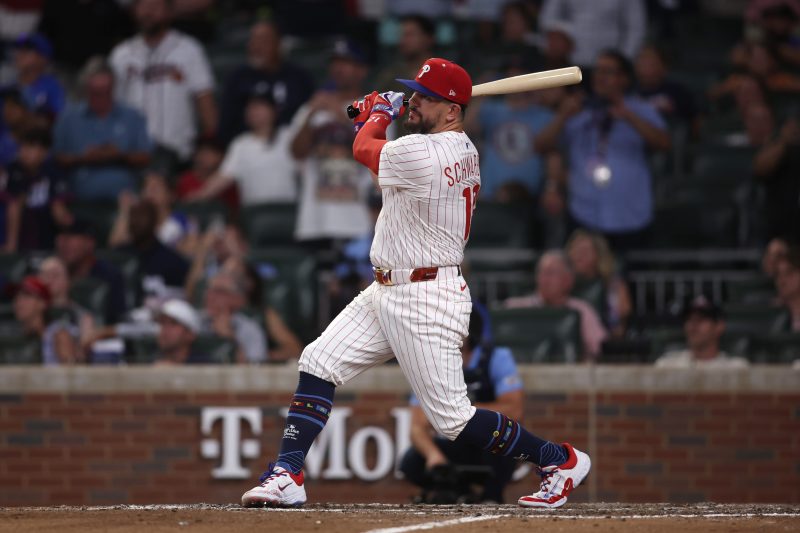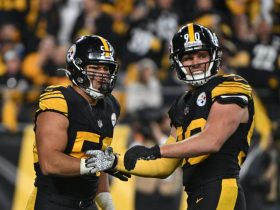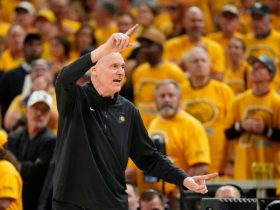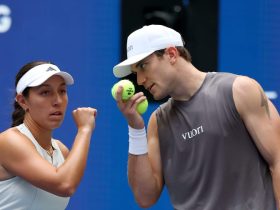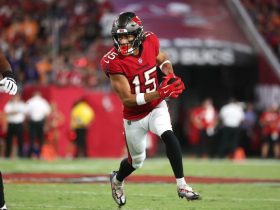ATLANTA — It was an All-Star Game like we’ve never seen before, leaving fans cheering, players celebrating and traditionalists screaming.
Gone forever are the days of Pete Rose crashing into Ray Fosse at home plate at the All-Star Game.
Major League Baseball took a page out of the Savannah Bananas’ playbook, deciding an All-Star Game with a mini-sized home run derby.
When the All Star Game ended July 15, there were only six players on the field playing home run derby, or technically called a swing-off, with the National League prevailing 7-6, based on the NL outhomering the American League, 4-3.
The swing-off quietly was put in the last collective bargaining agreement, declaring any All-Star Game that was tied after nine innings would be decided by a three-on-three home run derby.
The game ended when Tampa Bay Rays infielder Jonathan Aranda’s fly ball landed harmlessly in the outfield, with the scattered few players who remained celebrating into the night, immediately embracing the concept, with traditionalists wondering what has happened to this grand ol’ game.
‘Probably,’ San Francisco Giants starter Logan Webb said, when asked whether there would be a public outcry from baseball traditionalists. ‘But at the end of the day, who cares? We had a blast watching it, all the guys that are still here, and I think the fans enjoyed it. I got a group text here from a bunch of players around the league and they seemed to really like it, too.
‘I think it was an awesome way to end.’
Said New York Mets first baseman Pete Alonso: ‘I just thought it was awesome. I mean, everyone was super, super into it. I think people really thoroughly enjoyed the show.’
Really, it was impossible to find a player who was angry that the outcome was decided on a gimmick. No one wants a repeat of that 15-inning All-Star Game in Anaheim in 1967. And no one wanted to see another tie like the 2002 All-Star Game in Milwaukee.
Sure, these are historic All-Star Games, but they’re just exhibitions, too.
‘Pretty exciting,’ AL manager Aaron Boone said. ‘There’s probably a world where you could see that in the future, where maybe it’s in some regular season mix. I mean, I wouldn’t be surprised if people start talking about it like that.’
Really, a swing-off in regular season games that are tied after nine innings?
You mean, games that actually count?
‘Obviously, I don’t think that should happen, necessarily, or would at any time in the near future,’ Boone says. ‘But I’ve got to say, you know, it was pretty exciting. Like all of a sudden, here we go. And the camaraderie that you kind of build these last couple days with the team, I think went into overdrive there. Like guys were excited out there.
‘It’s like wiffle ball in the back yard. Here we go. Let’s do it.’
There weren’t any players rushing to lobby Commissioner Rob Manfred for a swing-off rule in games that count, but when asked if they could see it arriving one day in the future, well, why not?
There weren’t pitch clocks, enlarged bases, ghost runners on second base, and shift limits a few years ago, either.
‘I can totally see that,’ Miami Marlins outfielder Kyle Stowers told USA TODAY Sports. ‘We talked about pitching injuries, or the length of games, and honestly the runner on second base really helped in extra innings. Can you imagine if it happened in the postseason. I guess that would make it very unique.
‘But it’s like penalty kicks in soccer. Hockey has their form of it, a shootout, or whatever it is. So, I don’t think it’s ridiculous to say that it couldn’t be a part of the game.’
Well, maybe it will happen one day, Arizona Diamondbacks third baseman Eugenio Suarez said, but they may be all retired by the time they see it.
But for an All-Star Game, well, bring in the new tradition.
‘I think it’s a good idea,’ said Philadelphia Phillies DH Kyle Schwarber, who won All-Star MVP honors for hitting three home runs in his swing-off, ‘just for the fact we’re not putting more people at any other kind of risk. We’re not playing more innings, things like that …
‘I think it’s a unique way for the league to kind of try different things. It makes you feel like it’s a penalty kick. That was like the baseball version of a shootout or extra time.’
The swing-off occurred only because the National League blew a 6-4 lead going into the ninth inning, and with the game tied the sold-out crowd of 41,702 was unaware of the swing-off featuring three hitters from each team.
So were the players.
‘When they told me what was happening,’ Stowers said, ‘I thought they were kidding. I never heard of it. I thought it was like one of those hypotheticals you hear about in the minors or something.’
No, it was real, with each manager designating a list before the game of three hitters and an alternate for the swing-off. Each hitter was allowed only three swings. NL manager Dave Roberts chose Suarez, Schwarber and Alonso, only to switch out Suarez for Stowers after Suarez’s hand was throbbing from being hit by a pitch in the eighth inning. Boone chose Brent Rooker of the Athletics, Randy Arozarena of the Seattle Mariners and Aranda.
The first round began with Rooker hitting two home runs with Stowers hitting one.
Arozarena hit one homer to give the American League a 3-1 lead until Schwarber clobbered three home runs, 428 feet, 461 feet and 382 feet, for a 4-3 lead.
That was all that was needed when Aranda went homerless, and just like that, the wildest ending to an All-Star Game was in the books, with Schwarber becoming the first DH to win the MVP award, and the first Phillies player since 1964.
When asked how Schwarber will remember the night, and where it ranked among his career achievements, he really couldn’t say.
Really, no one could.
‘All I know,’ Suarez said, ‘is that it was historic. We were part of history. It was a great experience. But would I want to see it in regular season games, well, I don’t know about that. Let’s leave it like this.
‘I still like baseball tradition, you know.’
Follow Nightengale on X: @Bnightengale

